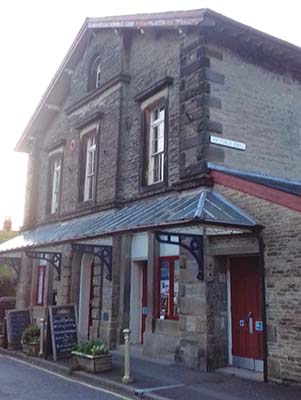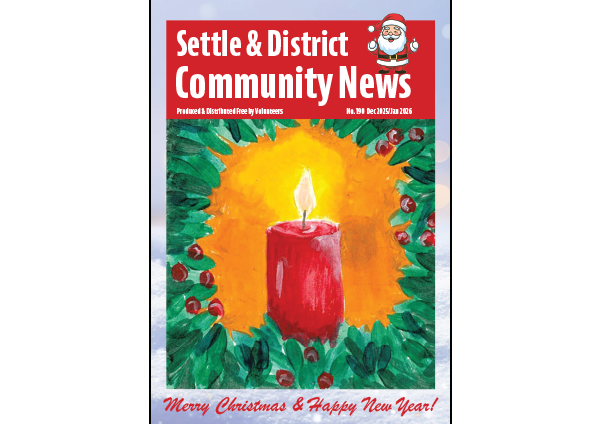

Settle’s Victoria Hall was seen on cinema screens around the world recently as part of the interval feature to mark the tenth anniversary of National Theatre Live.
An interview with Ann Harding, the hall manager, was used to show how the live screening of plays from the National Theatre in London could bring top quality drama to audiences that would rarely if ever have the opportunity to see them.
Michael Sheen was the star of that evening’s production of Nye, a new play about Aneurin Bevan the founder of the National Health Service.
Screening of National Theatre Live, together with shows from the Royal Opera House and Royal Ballet, has been part of a major transformation of the Victoria Hall over the past few years.
The hall has been the most important entertainment venue in Settle for more than 170 years. It opened in 1853, as part of a nationwide boom in music halls. It has hosted productions by the local operatic society almost every year since 1880. And in 1919 it began to show films too. Unlike many other venues it was spared a major fire that was the downfall of so many entertainment halls in the days of candles and inflammable scenery. Hence its claim to fame as the country’s oldest music hall.
Continuity has been a key part of what the Victoria Hall is all about. Administrator Josie Guthrie, the other full-time member of staff, alongside Ann Harding, says she still regards it as essentially a ‘music hall’.
Today you can see an astonishing array of musical acts at Victoria Hall. Recent appearances have included Nordic Fiddlers, a Northern Soul night and an excellent Elton John tribute act.
Ann Harding personally chooses the acts from the many approaches that the hall receives. Her aim is to ensure the hall provides a wide variety of entertainment and is ‘open to everyone’. It is frequently full to capacity, but Ann is at pains to point out that ticket sales form a very small part of the hall’s income. On average she says the hall receives just 50p for every ten pounds in ticket sales. The rest goes to the performers. That is why developing new sources of revenue has been so important in securing the hall’s future.
A former factory manager, Ann has been the driving force behind change since she came to the hall ten years ago. She says she is the sort of person who, when facing a problem, looks for the opportunities. She is willing to try things and if they don’t work, then move on and try something else.

Signing up for National Theatre Live was one of those big things that did work. It involved a big cost – £65,000 for the equipment, funded in part from a loan from the Keyfund organisation, plus some grants, for instance from TRAMPS, the Ribblesdale Area Moving Picture Show, the local voluntary group who were looking for better equipment to show their, largely, foreign language films. The big advantage of having projection equipment is that the venue gets to keep a much higher proportion of revenue than from live gigs.
However, soon after setting up the new equipment the Covid lockdown came and venues had to close for months. The Victoria Hall helped coordinate community support for the vulnerable. And as the lockdowns came to an end the next big idea was the development of the garden café. A once derelict area of land between the hall and the railway line that could have become a carpark is now an attractive summer venue for locals and visitors alike. Miss Victoria’s Emporium, the charity shop in the market square, is a further important source of new revenue.
But if Ann has the ideas, implementation is largely dependent on the hall’s volunteers. Ann and Josie as the two full-timers are backed by a handful of part time workers, doing specialist jobs but most of the legwork is done by a team of 146 volunteers. Some of them devote enormous amounts of time to hall business, whilst others just work once a year, on events like the beer festival.
Importantly, the hall also plays a wider role in the local economy. There is scarcely anywhere from the Isle of Skye to the Isle of Wight that is not home to someone who has bought Victoria Hall tickets. It is band followers that provide this great outreach. The evidence is that fans come to see their favourite artists and then stay to enjoy the Dales and, in many cases, come back for a holiday.
The interests of locals and visitors are intertwined. Ann gives an instance: there might be 15 people in Settle who are keen on a particular sort of music. The hall couldn’t afford to put on an event just for them. But what it can do is get a band that, in addition to those 15 locals, will attract another 100 or so from elsewhere and so make it worthwhile to put on the event.
There is also a wider social role that is at the centre of the Victoria Hall’s place in Settle society. It is a charity, a limited company and a social enterprise. It hosts community events as well as gigs. There can be few if any other places in the town that cater for all age groups and all interests. It would be hard to find anyone in the town who had not had a good time at the Victoria Hall on some occasion. Keeping up that 171-year-old tradition is why things have had to change and why they will continue to change.
To find out about future events, visit www.settlevictoriahall.org.uk




